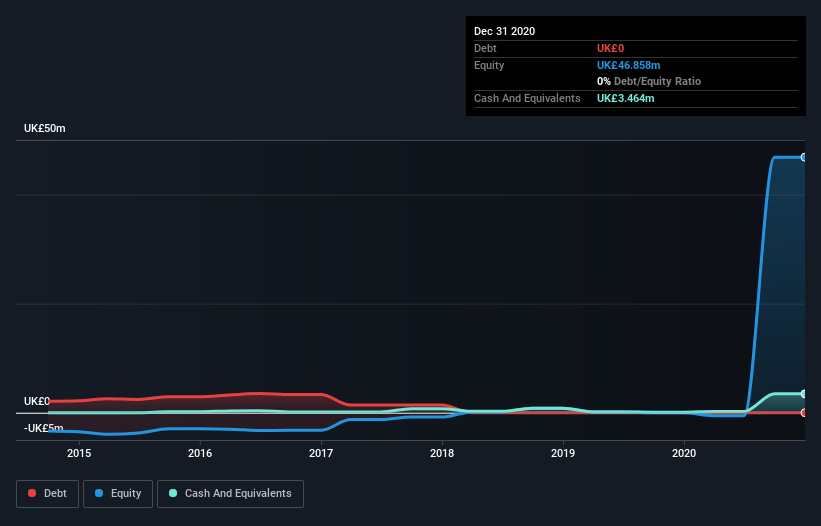Here's Why We're Not Too Worried About PowerHouse Energy Group's (LON:PHE) Cash Burn Situation
There's no doubt that money can be made by owning shares of unprofitable businesses. For example, biotech and mining exploration companies often lose money for years before finding success with a new treatment or mineral discovery. Nonetheless, only a fool would ignore the risk that a loss making company burns through its cash too quickly.
So should PowerHouse Energy Group (LON:PHE) shareholders be worried about its cash burn? For the purposes of this article, cash burn is the annual rate at which an unprofitable company spends cash to fund its growth; its negative free cash flow. Let's start with an examination of the business' cash, relative to its cash burn.
View our latest analysis for PowerHouse Energy Group
Does PowerHouse Energy Group Have A Long Cash Runway?
A company's cash runway is the amount of time it would take to burn through its cash reserves at its current cash burn rate. As at December 2020, PowerHouse Energy Group had cash of UK£3.5m and no debt. Importantly, its cash burn was UK£1.8m over the trailing twelve months. That means it had a cash runway of around 23 months as of December 2020. While that cash runway isn't too concerning, sensible holders would be peering into the distance, and considering what happens if the company runs out of cash. You can see how its cash balance has changed over time in the image below.
How Is PowerHouse Energy Group's Cash Burn Changing Over Time?
Although PowerHouse Energy Group had revenue of UK£100k in the last twelve months, its operating revenue was only UK£100k in that time period. We don't think that's enough operating revenue for us to understand too much from revenue growth rates, since the company is growing off a low base. So we'll focus on the cash burn, today. The skyrocketing cash burn up 146% year on year certainly tests our nerves. It's fair to say that sort of rate of increase cannot be maintained for very long, without putting pressure on the balance sheet. Admittedly, we're a bit cautious of PowerHouse Energy Group due to its lack of significant operating revenues. We prefer most of the stocks on this list of stocks that analysts expect to grow.
Can PowerHouse Energy Group Raise More Cash Easily?
Given its cash burn trajectory, PowerHouse Energy Group shareholders may wish to consider how easily it could raise more cash, despite its solid cash runway. Companies can raise capital through either debt or equity. Many companies end up issuing new shares to fund future growth. By looking at a company's cash burn relative to its market capitalisation, we gain insight on how much shareholders would be diluted if the company needed to raise enough cash to cover another year's cash burn.
Since it has a market capitalisation of UK£190m, PowerHouse Energy Group's UK£1.8m in cash burn equates to about 0.9% of its market value. That means it could easily issue a few shares to fund more growth, and might well be in a position to borrow cheaply.
How Risky Is PowerHouse Energy Group's Cash Burn Situation?
On this analysis of PowerHouse Energy Group's cash burn, we think its cash burn relative to its market cap was reassuring, while its increasing cash burn has us a bit worried. Based on the factors mentioned in this article, we think its cash burn situation warrants some attention from shareholders, but we don't think they should be worried. On another note, we conducted an in-depth investigation of the company, and identified 4 warning signs for PowerHouse Energy Group (3 are significant!) that you should be aware of before investing here.
Of course, you might find a fantastic investment by looking elsewhere. So take a peek at this free list of companies insiders are buying, and this list of stocks growth stocks (according to analyst forecasts)
This article by Simply Wall St is general in nature. It does not constitute a recommendation to buy or sell any stock, and does not take account of your objectives, or your financial situation. We aim to bring you long-term focused analysis driven by fundamental data. Note that our analysis may not factor in the latest price-sensitive company announcements or qualitative material. Simply Wall St has no position in any stocks mentioned.
Have feedback on this article? Concerned about the content? Get in touch with us directly. Alternatively, email editorial-team (at) simplywallst.com.

 Yahoo Finance
Yahoo Finance 
